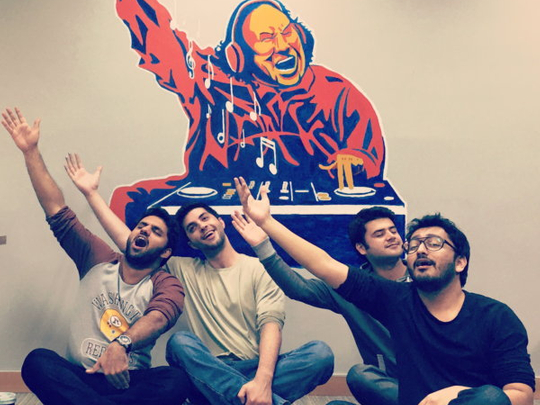
From 450 participants, one winner emerged. Pakistan’s StartUp Cup 2015 brought together an eclectic mix of start-ups from across the country. The winner, announced late January, was Patari — a music service dubbed the Spotify of Pakistan. Runners-up were cloud-based Wi-Fi hotspot system Wifigen and food start-up MARO Tandoors.
Organised by TiE Islamabad and the US Embassy, the StartUp Cup has since 2013 helped more than 850 start-ups “jump off the fence and into the marketplace” through Build-a-Business workshops, regular mentoring, pitching sessions and testing business models.
Zeeshan Bin Shahid, Senior Programme Manager at TiE Islamabad, tells GN Focus Pakistan’s start-up scene is heating up and investment in start-ups increased 600 per cent last year. Global heavyweights like Naspers and Rocket Internet made sizeable late stage investments, including $56 million (Dh206 million) in Daraz, an Amazon-style e-commerce start-up.
Bilal Athar, CEO of Wifigen, estimates foreign investments in start-ups to have been more than $100 million in 2015. Local start-ups, meanwhile, have started investing in other new entrants — Pakwheels.com in Autogenie.pk, Rozee.pk in a tour planner venture, and footwear start-up Markhor in Y Combinator.
Pakistan currently has about 12 incubation centres, which are likely to grow to 20 by the end of this year, adds Athar.
However, Khalid Bajwa, Co-founder of Patari, says the country’s start-ups are still in their infancy, and lack a clear, home-grown star-winner, but that the ecosystem is on the cusp of something big.
Arusha Imtiaz, Founder of SMAC Factory, which uses social, mobile, analytics and cloud to drive business innovations in schools, says the concept of start-ups is still new and cool and everyone is just getting their head around it.
Saifullah Minhas, CMO at MARO Tandoors, believes there is newfound respect for start-ups. “More graduates are looking to start their own businesses — a definite change from three or four years ago.”
What works
Minhas believes that, as a developing country with a large population, Pakistan offers tremendous opportunities for start-ups to implement ideas that have been tried and tested in developed countries, but haven’t permeated the national market yet. Bajwa, meanwhile, says having the world’s second-highest broadband growth rate, and more than 20 million 3G-enabled phones, make the nation very attractive for start-ups.
Shahid agrees that 3G and 4G will be a “great contributing factor” in the rise of tech startups. He also thinks Pakistan’s rising middle class is “more educated and optimistic about risk-taking, which constitute the building blocks of an innovative tech economy”.
Imtiaz sees a challenge in the country’s problems. “Finding a solution to every problem is an opportunity for entrepreneurs,” she says. “And Pakistan is a country of people wired to be hardworking and passionate.”
Athar, meanwhile, highlights the availability of cheap labour. “You surely can’t find a great developer for $300 a month in Silicon Valley, but in Pakistan I bet you can.”
A big hurdle remains the paucity of late-stage funding. Bajwa says many start-ups in the country are at a stage where they can raise some seed money but it is still tough getting to Series A. “That means most start-ups die out in that period between raising seed and actually exploding with success.”
However, the biggest challenge has been the lack of proper payments system. And it will continue to be an issue “unless telcos — who are building payment walled gardens — change their ways, or the State Bank pushes for debit cards to be allowed for payments online”.
The country also lacks a functioning investor and mentor network. “There are very few people you can actually ring up and go ‘Hey, I need help with X,’” says Bajwa. “This being the first crop of start-ups, a network like that is severely lacking in Pakistan.”
The road ahead
Despite the drawbacks, most founders are optimistic Pakistan can become the next big destination for start-ups and investors. Athar says people follow trends, and entrepreneurship is the new trend in town.
Another advantage, says Shahid, is that many Pakistanis are returning from Silicon Valley to start their own ventures.
“It is with a great deal of confidence that we can say Pakistan will see its first billion-dollar start-up within a year, or maybe a year and a half at the most,” says Minhas. “There is also no doubt that it will be the first of many, if the ecosystem is to continue growing at this pace.”







